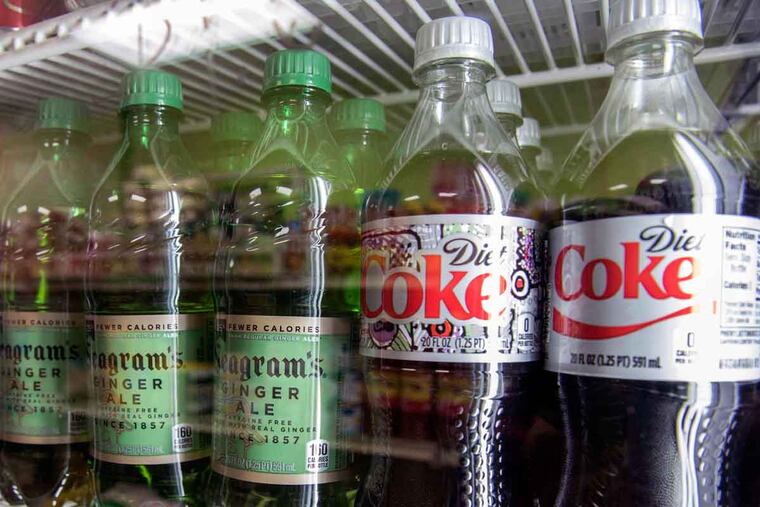Commentary: With soda tax, Philly chooses cycle of failure
Following a long campaign that drew support from both revenue-hungry local-spending advocates and paternalist nonprofits and foundations, Philadelphia City Council has approved a 11/2-cent-per-ounce tax on soft drinks, whether naturally or artificially sweetened, on top of an existing 8 percent city sales tax, adding about a dollar to the cost of a two-liter bottle.

Following a long campaign that drew support from both revenue-hungry local-spending advocates and paternalist nonprofits and foundations, Philadelphia City Council has approved a 1 1/2-cent-per-ounce tax on soft drinks, whether naturally or artificially sweetened, on top of an existing 8 percent city sales tax, adding about a dollar to the cost of a two-liter bottle.
Lay aside for now the specter of nanny-statism (former New York City Mayor Michael Bloomberg chipped in for a pro-tax ad campaign) and whether a notoriously profligate City Hall should be grabbing yet more money from the pockets of everyday citizens. I'd rather bring in Samuel Johnson, whose 1755 English dictionary offered a definition of excise (a duty laid upon a particular article of commerce) as "a hateful tax, levied by wretches."
Why would an excise tax, then or now, arouse such passion? We're not surprised today when our neighbors vent over the personal income tax or (if in Europe) the value-added tax. Those taxes entangle a broad spectrum of economically active people and require what is often onerous paperwork. On the other hand, an excise tax on an article of commerce, like wine or fuel, is typically designed to be funneled through a relatively few merchants charged with collecting it, and it's usually fairly easy to calculate and keep records for compared with other taxes.
One reason is that while all taxes are evaded to some extent, excise taxes are especially subject to evasion based on local geography, raising enforcement challenges that can distinctively undermine the rule of law:
As states push up tobacco excise taxes, cigarette smuggling, often with links to organized crime, makes further inroads into the higher-tax states, along with evasion-friendly practices such as the sale of "loosies."
Consumers respond to differential state levies on alcohol by driving to nearby states to buy liquor. Massachusetts famously responded by sending officers to note down its own citizens' license plates in the parking lots of New Hampshire liquor stores.
Because evasion of an excise tax depends on covert transport and storage, ordinary travelers and owners of space sometimes get hassled even if they themselves are in no way involved in the smuggling. This is why, over the history of Anglo-American law, some of the key battles over search and seizure, surveillance, and the use of informants resulted from excise-tax enforcement, and why public resistance often focused on the outrages of royal inspection.
Now, while the soda tax will create openings for both casual and organized lawbreaking, only cynics imagine that it will lead to informant-driven midnight busts on underground soda depots. The more likely route of evasion for consumers will be the simple and legal step of driving to the many commercial outlets that surround the city. Soda sales are an important competitive edge and source of profits for the wider grocery and convenience-store business, which spells trouble for such businesses within the city.
Consider what happened in Baltimore, which enacted a bottle tax in 2010 (with the excuse, in part, of funding school repairs). Critics, including the National Federation of Independent Business and American Beverage Association, predicted that commerce in the city would be harmed, and that's exactly what happened. Painfully, the landmark 83-year-old Santoni's Supermarket in Highlandtown was among the losses. Owner Rob Santoni said the tax had caused an "irreversible" decline in business as customers fled for suburban stores; beverage sales had slumped 28 percent and customer traffic 20 percent. Eighty workers would lose their jobs. "What has taken 83 years to build has been torn down by one person [the mayor] and one bad law," he told the Baltimore Sun.
More recently, Walmart closed its only Baltimore location, and local grocery chain Mars announced that it would close all its Baltimore stores.
Can you guess what's happened now? Right: Baltimore this winter offered huge one-off tax breaks to supermarkets willing to locate in the city to help solve what was said to be the public health crisis of "food deserts."
Philadelphia officials are apparently determined to lock their city into the same cycle of failure.
Walter Olson is a senior fellow at the Cato Institute. wolson@cato.org